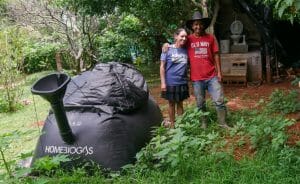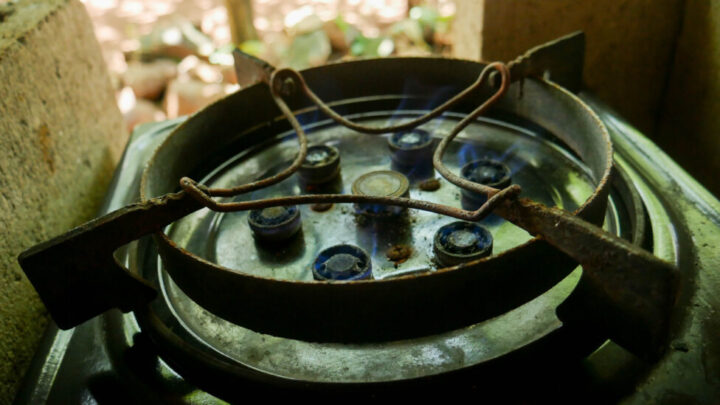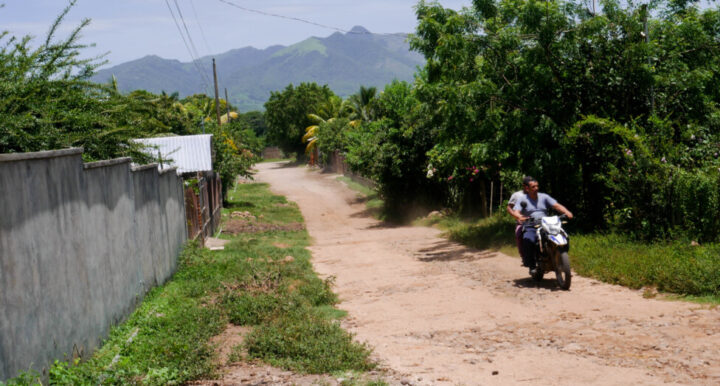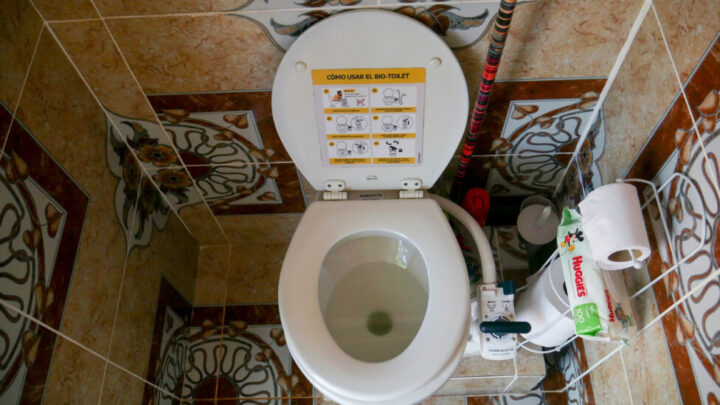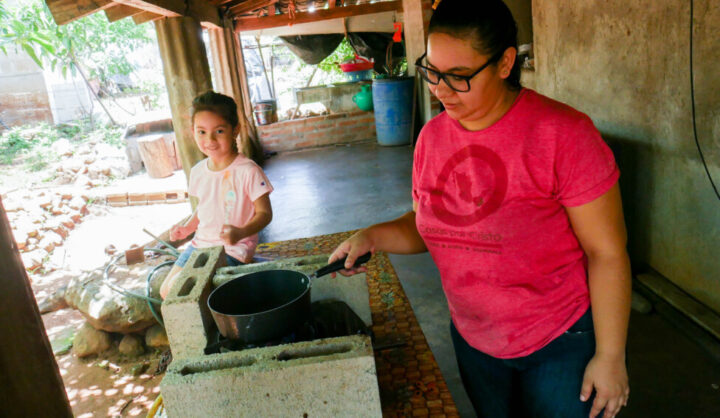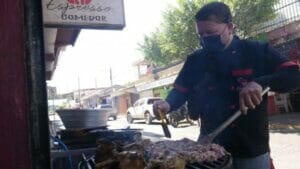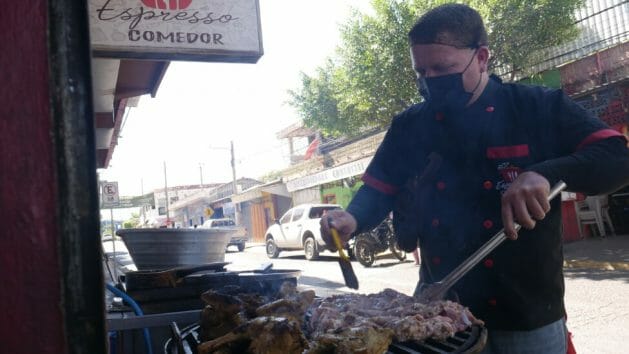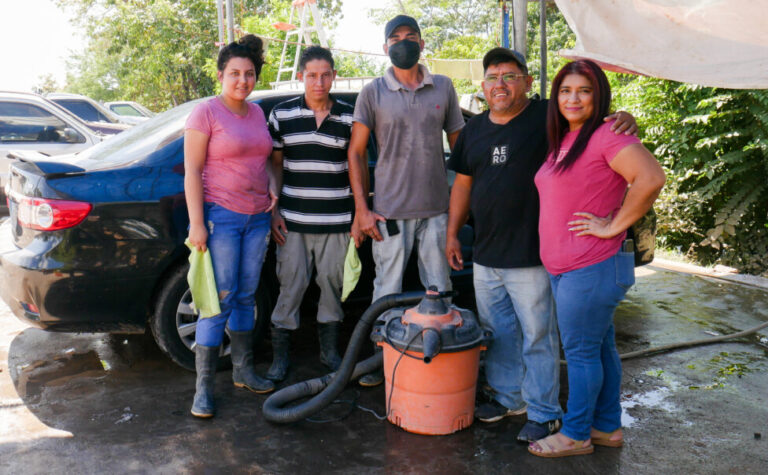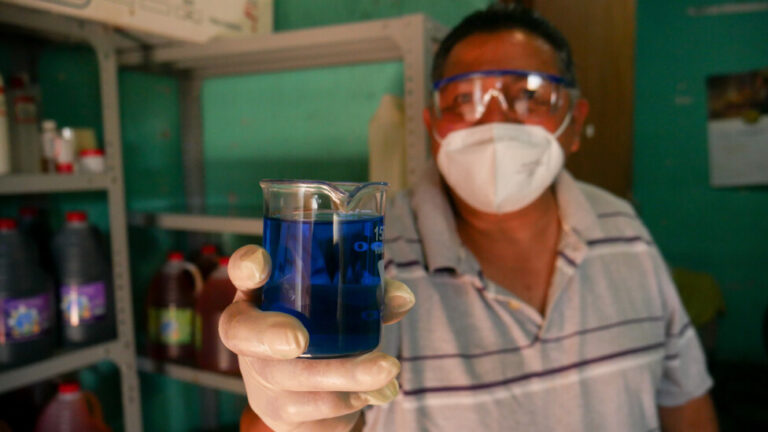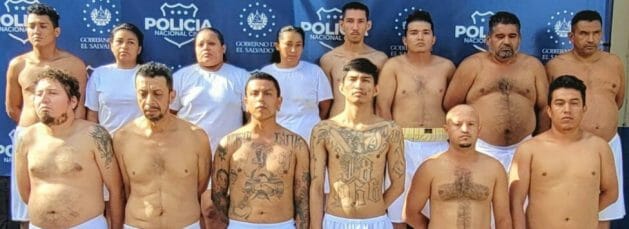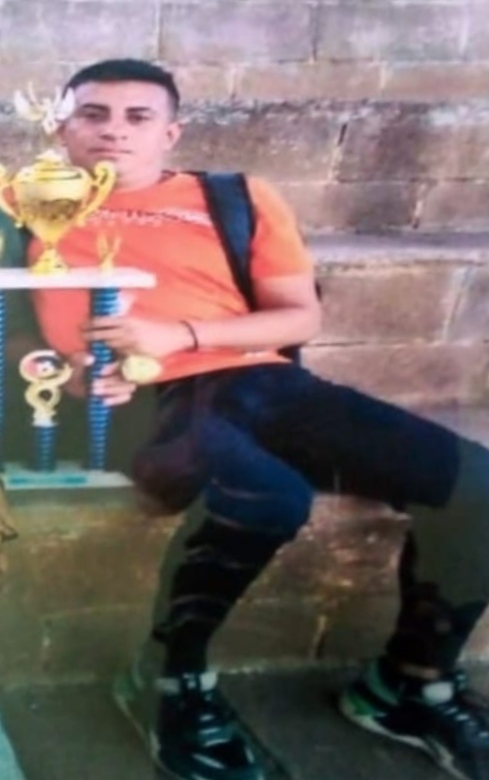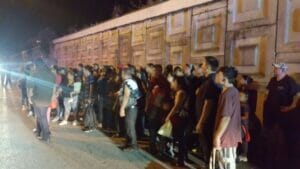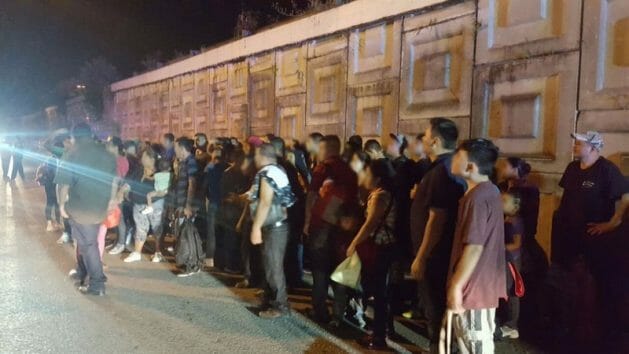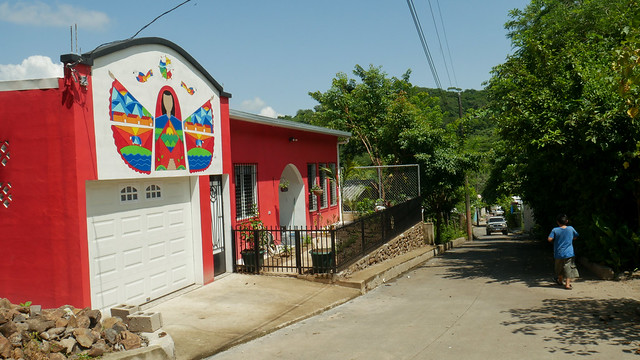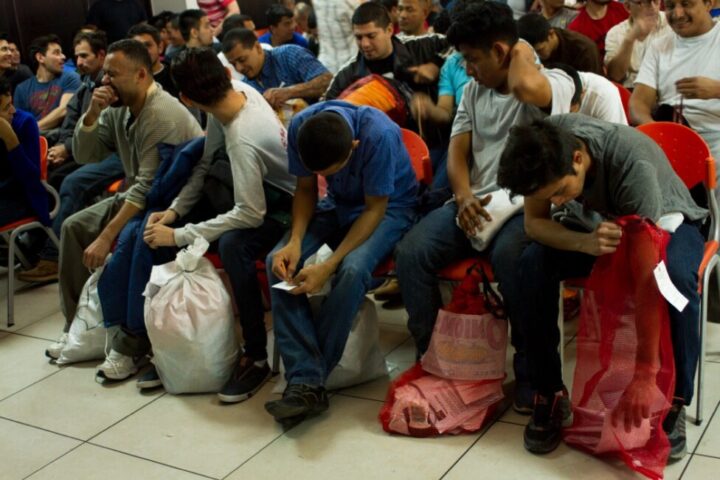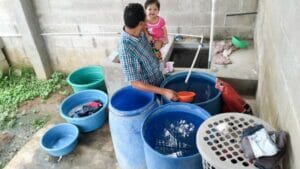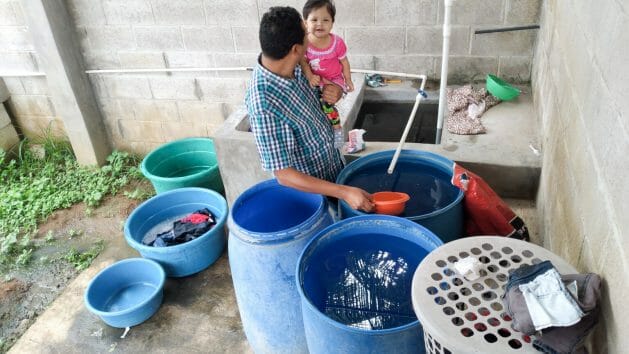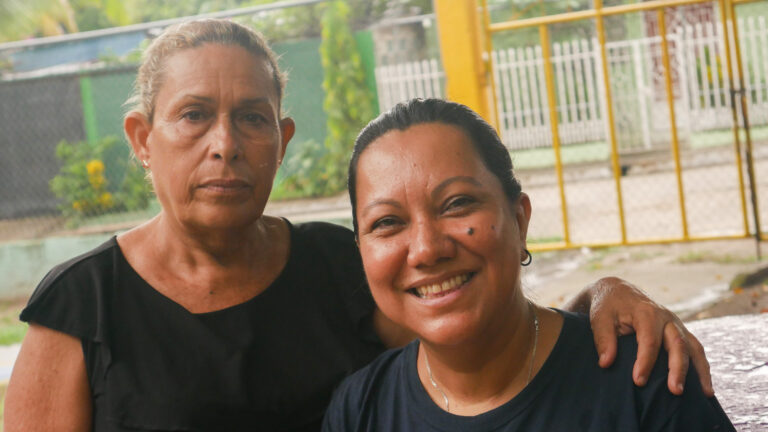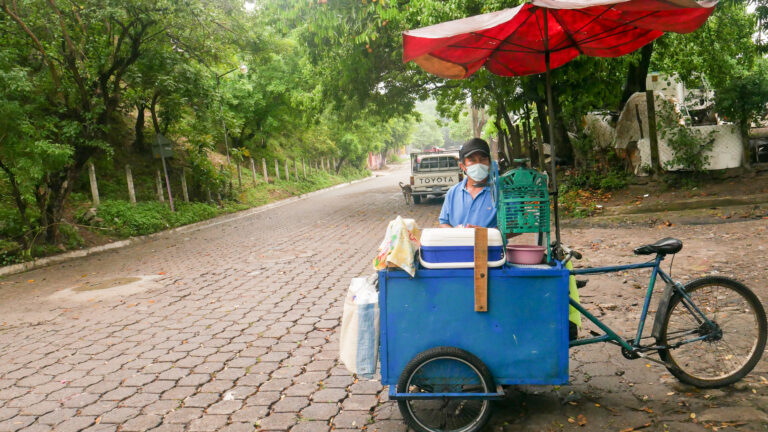
Civil Society, Development & Aid, Editors’ Choice, Education, Featured, Headlines, Human Rights, Indigenous Rights, Latin America & the Caribbean, Population, Regional Categories
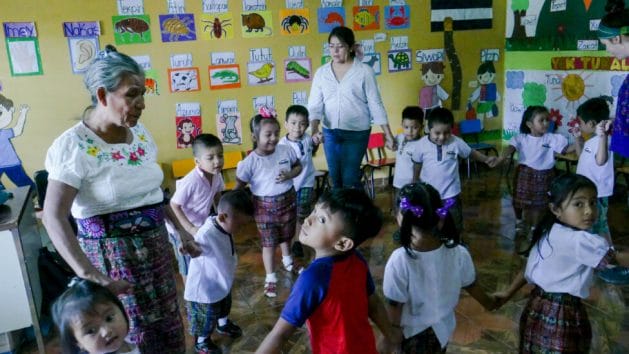
Elena López (left), one of two teachers who teach Náhuat to children in Nahuizalco, in western El Salvador, leads one of the morning’s learning practices, in which the children, walking in circles, sing songs in the language of their ancestors, the Pipil people. CREDIT: Edgardo Ayala / IPS
– A group of children participating in an immersion program in Náhuat, the language of the Pipil people and the only remaining pre-Hispanic language in El Salvador, are the last hope that the language will not die out.
“This effort aims to keep Náhuat alive and that is why we focus on the children, for them to continue and preserve this important part of our culture,” Elena López told IPS during a short snack break for the preschoolers she teaches.
“This effort aims to keep Náhuat alive and that is why we focus on the children, for them to continue and preserve this important part of our culture.” — Elena López
López is part of the Náhuat Cuna project, which since 2010 has sought to preserve and revive the endangered indigenous language through early immersion. She is one of two teachers who teach it to children between the ages of three and five at a preschool center in Nahuizalco, a municipality in the department of Sonsonate in western El Salvador.
At risk of disappearing
“When a language dies, the basis of indigenous cultures and territories becomes extinct with it,” says the report Revitalization of Indigenous Languages, according to which the 500 Amerindian languages still spoken in Latin America are all in a situation of greater or lesser threat or risk.
In Mesoamerica, which includes Mexico, Guatemala, Belize, Honduras, El Salvador, Nicaragua and Costa Rica, 75 indigenous languages are spoken, says the study by the Fund for the Development of the Indigenous Peoples of Latin America and the Caribbean (FILAC).
With the exception of Mexico, Guatemala is the most linguistically diverse in this group of countries, with 24 native languages. The most widely spoken is K’iche’, of Mayan origin, and the least is Xinca, of unknown origin.
Brazil is the most ethnically and linguistically diverse country in Latin America, with between 241 and 256 indigenous peoples and between 150 and 186 languages.
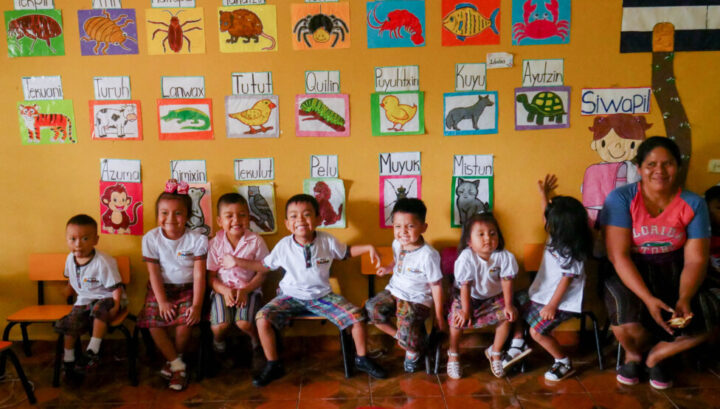
A picture of some of the children learning Náhuat in the town of Nahuizalco, in western El Salvador, through an early language immersion program, in an effort by Don Bosco University to keep the endangered language alive. Teacher Elsa Cortez sits next to them. CREDIT: Edgardo Ayala / IPS
Around 25 percent of these languages are at risk of extinction unless something is urgently done, the report warns. It is estimated that Latin America is home to more than 50 million people who self-identify as indigenous.
“These languages are losing their usage value…families are increasingly interrupting the natural intergenerational transmission of the languages of their elders, and a slow but sure process of moving towards the hegemonic language is observed, with speakers making Spanish or Portuguese their predominant language of use,” the report states.
The causes of the danger of the disappearance of these Amerindian languages are varied, the report points out, such as the interruption of intergenerational transmission, when the language is no longer passed on from generation to generation.
And that is exactly what the Náhuat Cuna project aims to revert by focusing on young children, who can learn from Náhuat speakers who did receive the language from their parents and grandparents and speak it fluently.
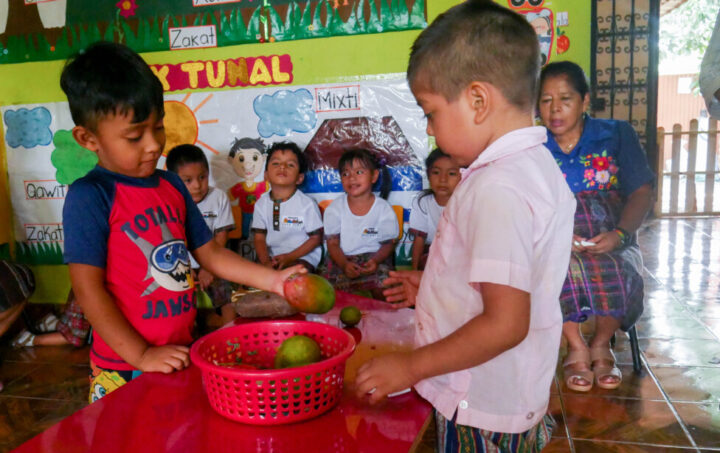
Two boys pretend to purchase and sell fruits and vegetables speaking in Náhuat, as part of the teaching exercises at Náhuat Cuna in western El Salvador, a preschool for new generations of Salvadorans to learn the nearly extinct Amerindian language. CREDIT: Edgardo Ayala /IPS
López is one of these people. She belongs to the last generation of speakers who acquired it naturally, as a mother tongue, speaking it from a very young age with her parents and grandparents, in her native Santo Domingo de Guzmán, also in the department of Sonsonate.
“That’s how I was born and grew up, speaking it at home. And we never stopped speaking it, among my sisters and brothers, but not with people outside the house, because they discriminated against us, they treated us as Indians but in a derogatory way, but we never stopped speaking it,” said Lopez, 65.
Indeed, for reasons of racism and classism, indigenous populations have been marked by rejection and contempt not only from the political and economic elites, but also by the rest of the mestizo or mixed-race population, which resulted from the mixture of indigenous people with the Spaniards who started arriving in Latin America in the sixteenth century.
“They have always looked down on us, they have discriminated against us,” Elsa Cortez, 43, the other teacher at the Nahuizalco Náhuat Cuna, told IPS.
And she added: “I feel satisfied and proud, at my age it is a luxury to teach our little ones.”
Both López and Cortez said they were grateful that the project hired them as teachers, since they had no prior teaching experience, and in a context in which discrimination and social rejection, in addition to ageism, make it more difficult to find formal employment.
Before joining the project, Cortez worked full time making comales, which are circular clay griddles that are placed over a wood fire to cook corn tortillas. She also sold baked goods, and continues to bake bread on weekends.
López also worked making comales and preparing local dishes, which she sold in her neighborhood. Now she prefers to rest on the weekends.
All is not lost
When IPS visited the Náhuat Cuna preschool in Nahuizalco, the three-year-olds were performing an exercise: they stood in front of the rest of the class of about ten children and introduced themselves by saying their first name, last name and other basic greetings in Náhuat.
Later they identified, in Náhuat, pictures of animals and elements of nature, such as “mistun” (cat), “qawit” (tree) and “xutxit” (flower). The students started their first year in the center in February, and will spend two years there.
The five-year-olds are the most advanced. Together, the two groups totaled about twenty children.

Jorge Lemus (blue shirt), director of El Salvador’s Náhuat/Pipil Language Revitalization Program and the driving force behind the Náhuat Cuna project, which teaches the language to children between the ages of three and five, is photographed with indigenous women of the Pipil people in Nahuizalco in western El Salvador. CREDIT: Don Bosco University
At the end of their time at the Cuna, they will go to regular school in Spanish, with the risk that they will forget what they have learned. However, to keep them connected to the language, the project offers Saturday courses where they begin to learn grammar and how to write the language.
There is a group of 15 teenagers, mostly girls, who started at the beginning of the project and speak the language fluently, and some even teach it online.
The initiative is promoted by the Don Bosco University of El Salvador, and supported by the municipalities where they operate, in Nahuizalco and Santo Domingo de Guzmán. The Santa Catarina Masahuat branch will also be reopened soon.
Santo Domingo de Guzmán is home to 99 percent of the country’s few Náhuat speakers, who number around 60 people, Jorge Lemus, director of El Salvador’s Náhuat/Pipil Language Revitalization Program and main promoter of the Náhuat Cuna project, told IPS.
“In three decades I have seen how Náhuat has been in decline, and how the people who speak it have been dying out,” stressed Lemus, who is also a professor and researcher of linguistics at the School of Languages and Education at Don Bosco University, run by the Salesian Catholic order.
According to the academic, the last three indigenous languages in El Salvador in the 20th century were Lenca, Cacaopera and Náhuat, but the first two disappeared by the middle of that century, and only the last one survives.
“The only one that has survived is Náhuat, but barely, as there are perhaps just 60 speakers of the language. When I started working on this there were about 200 and the number continues to shrink,” said Lemus.
The only way to keep the language alive, he said, is for a new generation to pick it up. But it will not be adults, who could learn it as a second language but will continue speaking Spanish; it must be a group of children who can learn it as native speakers.
The expert clarified that, although they come from the same linguistic trunk, the Náhuat spoken in El Salvador is not the same as the Nahuatl spoken in Mexico, and in fact the spelling is different.
In Mexico, Nahuatl has more than one million speakers in the Central Valley, he said.
In El Salvador, in 1932, the Pipil people stopped speaking their language in public for fear of being killed by the government forces of General Maximiliano Hernández, who that year brutally cracked down on an indigenous and peasant uprising demanding better living conditions.
At that time, society was dominated by aristocratic families dedicated to coffee cultivation, whose production system plunged a large part of Salvadorans, especially peasants and indigenous people, into poverty.
Lemus argued that for a language to make a decisive comeback and become a vehicle for everyday communication would require a titanic effort by the State, similar to the revival of the Basque language in Spain, Maori in New Zealand or even Israel’s resuscitation of Hebrew, which was already a dead language.
But that is not going to happen in El Salvador, he said.
“The most realistic thing we want to achieve is to keep the language from disappearing, and for the new generation of Náhuat-speaking people to grow and multiply. If we have 60 speakers now, in a few years we will hopefully still have 50 or 60 speakers, from this new generation, and they will keep it alive in the communities and continue speaking it,” he said.
For her part, López wants to continue working towards this goal in order to leave the country her legacy.
Speaking in Náhuat, the preschool teacher said: “I really like teaching this language because I don’t want it to die, I want the children to learn and speak it when I am dead.”

